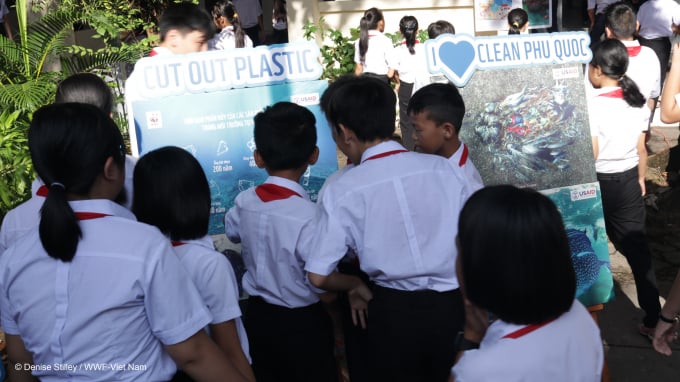November 21, 2025 | 21:48 GMT +7
November 21, 2025 | 21:48 GMT +7
Hotline: 0913.378.918
November 21, 2025 | 21:48 GMT +7
Hotline: 0913.378.918
According to a research on the Vietnam consumers' awareness and attitude towards plastics waste conducted by the World Wild Fund for Nature in Vietnam (WWF -Vietnam) in 2020, numerous people were not aware of the harmful effects of single-use plastic waste on the environment.
Only a small percentage of Vietnamese consumers were fully conscious of plastic waste pollution. Meanwhile a large number of people even did not know much about the government's anti-plastic waste programs.

Students at Duong Dong Secondary High School (Phu Quoc) were learning how to reduce plastic waste. Photo: WWF.
Most fishermen did not know about the impacts of plastic waste on the environment. According to the survey conducted by WWF - Vietnam, fewer than 3% said that they knew about the state's programs or activities in the effort to stop plastic pollution. About 10% said that they partially know about the State's anti-plastic waste programs. This was a big challenge for pushing propaganda programs, mobilizing society in general and fishermen, aquatic farmers in particular to reduce one-single plastics in the near future.
The majority of consumers said that disposable plastic bags were free of charge items whenever they bought some certain products. Because they were free of charge products many people had never wondered if plastic bags were actually free or they were included in the costs of the main products or if they had any impact on the environment or human health. For that reason, most consumers did not believe that the responsibility for reducing plastic waste lies with themselves.
Only a small number of young people, workers, officers, fishermen and housewives agreed that they themselves needed to reduce plastic waste. For fishermen in particular, the percentage was even lower as only one out of five fishermen agreed with reducing plastic waste, according to the survey (2020) by WWF -Vietnam. However they all agreed that plastic waste pollution will decrease when every individual reduce plastic waste. Generally, fishermen considered single-use plastics as a popular demand of the society making hard to reduce plastic pollution. Only 17% of fishermen expressed the attitude that "I myself need to reduce single-use plastics".
Also according to the WWF's report, the fisheries sector in Vietnam generated 68,150 tons of garbage per year of which 3,814 tons were dumped into the sea. Plastics including plastic bags, bottles, fishing nets and foam boxes are popular in the fisheries sector.
Plastic waste directly poses a great threat to marine organisms and also indirectly affects the ecosystem. With the characteristics such as slow to decompose and toxic, plastic wastes can reduce the quality of seafood, contaminating the sea water especially at bays and river mouths.
To effectively manage plastic waste generated from the fisheries sector, the Directorate of Fisheries under the Ministry of Agriculture and Rural Development (MARD) has taken specific steps as follows:
Official Dispatch No 4914/BNN-VP dated July 11, 2019 of the MARD on responding to the Prime Minister's call to join hands to solve the problems of plastic waste.
Official Dispatch No 244/TCTS-KHCN&HTQT dated January 17, 2020 of the Directorate of Fisheries on "Joining hands to solve the problem of ocean pollution";
Decision No 1777/QĐ-BNN-TCTS dated May 20, 2020 of the MARD on the assignment of the action plan on marine plastic waste management for the fisheries sector, 2020-2030 period
Decision No 282/QĐ-TCTS-KHCN&HTQT dated May 25, 2020 of the Directorate of Fisheries on the assignment of the action plan on marine plastic waste management for the fisheries sector, 2020-2030 period
Decision No 687/QĐ-BNN-TCTS dated January 5, 2020 of the MARD on the approval of the action plan on marine plastic waste management for the fisheries sector, 2020-2030 period
Under the framework of the project "Reducing marine plastics in Vietnam", the WWF and the Directorate of Fisheries have coordinated to implement a pilot communication campaign to raise the awareness and to change the attitude of fishermen and coastal communities towards marine plastics; reducing plastic waste, collecting and sorting wastes from sources, reusing and recycling plastics, gradually using eco-friendly alternatives for the plastic in the fisheries sector.
Translated by Mai Tham
/2025/11/21/3348-2-102623_454.jpg)
(VAN) National Assembly delegate Nguyen Thi Lan has proposed adding special mechanisms to attract human resources to the agricultural, forestry, and fishery sectors, addressing the shortage of high-quality personnel.

(VAN) Over the past two decades, the unified legal framework for water resource management has been perfected, becoming a crucial foundation for ensuring national water security.

(VAN) The land-data cleansing campaign in Dien Bien is entering its final stretch, yet weak infrastructure, limited personnel and fragmented multi-period datasets continue to create major obstacles.
/2025/11/20/0204-2-115235_496.jpg)
(VAN) Not only do carbon credits bring a great revenue source, but they also contribute to better forest protection and development. However, this potential remains largely untapped.

(VAN) Applying modern technology is helping environmental monitoring and oversight of management quality.

(VAN) Viet Nam’s economic losses could reach 12–14.5% of GDP annually by 2050 if no climate-response measures are implemented.

(VAN) Initial calculations suggest that blue carbon initiatives could reduce CO2 emissions by approximately 3 million tons in Viet Nam by 2035.